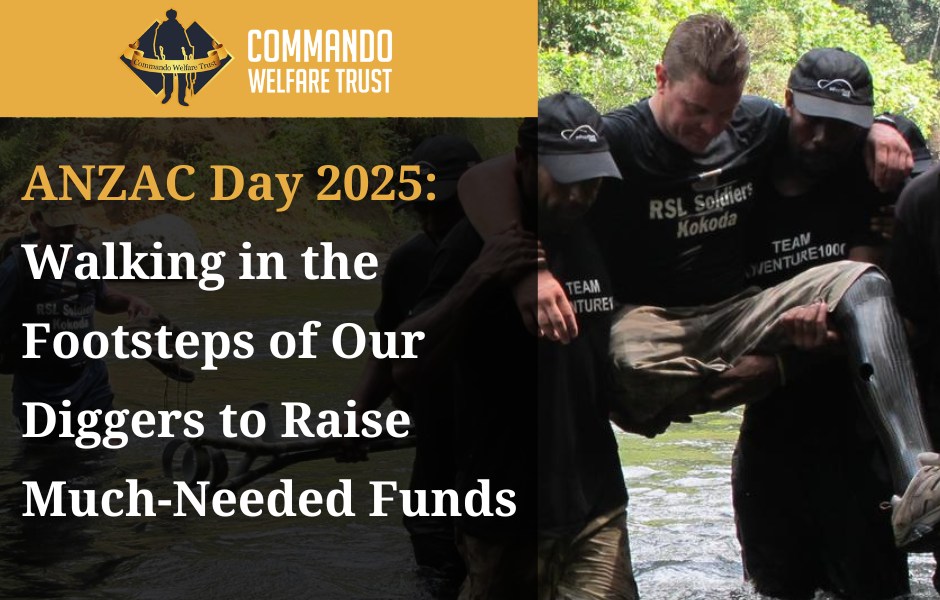
This ANZAC Day, Australians across the country pause to remember the service and sacrifice of our diggers — past and present. But for some, remembrance is not a moment, it’s a lifetime commitment.
On 1 May 2025, a group of Australians will set out to walk the Kokoda Track, retracing the steps of our wartime heroes. More than just a physical challenge, the trek will raise crucial funds for the Commando Welfare Trust, supporting Special Forces soldiers, veterans, and their families.
Unfortunately, this mission is driven by real demand. In the past year alone, the number of families we support has grown from 42 to 49, and the number of children whose education we fund has risen from 28 to 35. Behind every one of these numbers is a story of service, sacrifice, and silent strength.
From paying off the mortgage of a paralysed war hero over five years, to providing 15 years of ongoing support to the family of Sergeant Brett Till, who was killed in action in Afghanistan in 2009.
We stand with these families not just in the immediate aftermath of tragedy, but for the long haul.
Our work fills the critical gaps.
In 2024, a record $1,000,000 in support was delivered to SOCOMD families, covering everything from school fees to emergency accommodation, complex medical costs, and mortgage repayments for injured veterans.
The dangers of military service persist even in peacetime.
Over the past 24 months, five soldiers were lost in training incidents, including Lance Corporal Jack Fitzgibbon, Captain Daniel Lyon, Corporal Alexander Naggs, Lieutenant Maxwell Nugent, and Warrant Officer Class Two Joseph Laycock.
Each death leaves behind grieving families, whose futures are uncertain.
We restore stability, strength and dignity.
As the Royal Commission into Defence and Veteran Suicide has shown, the impacts of service extend far beyond the battlefield.
Male serving permanent members are 30% more likely to die by suicide than Australian employed males. Over the past decade, this has equated to an average of 78 serving or ex-service members dying by suicide each year — or one life lost every five days. This confronting reality highlights the scale and urgency of the mental health crisis facing our Defence community.
Additionally, males serving in combat and security roles are two times more likely to die by suicide than Australian employed males.
This is a particularly concerning statistic for the Commando Welfare Trust, as Special Forces members conducted the majority of Australia’s combat operations over the past 30 years and have borne 50% of the casualties.
One emerging concerning issue within the veteran and Defence Force community is mild traumatic brain injury (mTBI), particularly from repeated blast exposure.
These invisible wounds carry lasting consequences — from depression, chronic pain and early-onset dementia to broken families and financial hardship.
Unlike more visible physical injuries, mTBI is often caused by close proximity to explosions — such as grenades, artillery, and breaching charges — and can occur even without a direct blow to the head.
Without urgent national awareness and investment in treatment pathways, Australia risks being overwhelmed by a wave of blast-induced brain injuries.
We are committed to working with Defence, the Department of Veterans’ Affairs (DVA), and our partners to ensure veterans affected by mTBI receive the medical care they need.
Moreover, we are dedicated to supporting initiatives that improve safety measures, preventing future cases of this debilitating condition.
Finally, our national security is under strain. A shrinking pool of enlistments, global instability, and rising mental health challenges all threaten our Defence Force’s future. Supporting our soldiers — before, during, and after service — is no longer just an act of gratitude.
It is a national imperative to guarantee our freedom.
As we honour the fallen this ANZAC Day, let us also recommit to the living. Let us walk beside them — in Kokoda, in crisis, and in recovery.
Let us ensure that no one who serves is ever left behind and support our past and present serving members.
Lest we forget.